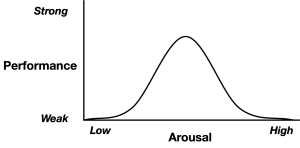Emotion matters. Yes, largely it’s a cultural construct, as Lisa Feldman Barrett tells us. Still, they can help or hinder learning. When designing games or creating meaningful learning, they matter. But they also affect us in our daily activities.
So, my previous post, on misinformation, is personal. I’ve frustration that family members are buying into some of it. I try to maintain a calm demeanor, but it’s challenging. Still, it’s a battle I’ve not yet given up on. Yet, I’m also not immune to the larger effects of emotion.
 What we know, from the Yerkes-Dodson Curve, is that a little bit of arousal (read: emotion) can help, but too much can hurt. What isn’t clear from my conceptual rendering is what amount is the ‘right’ amount of arousal for optimal performance. I’ll suggest that for learning, it’s pretty low, as learning is stressful (another synonym for arousal). And I do suggest we manipulate emotions (which I admit is shorthand for motivation, anxiety, and confidence, which aren’t the regular definition) to successfully achieve learning outcomes.
What we know, from the Yerkes-Dodson Curve, is that a little bit of arousal (read: emotion) can help, but too much can hurt. What isn’t clear from my conceptual rendering is what amount is the ‘right’ amount of arousal for optimal performance. I’ll suggest that for learning, it’s pretty low, as learning is stressful (another synonym for arousal). And I do suggest we manipulate emotions (which I admit is shorthand for motivation, anxiety, and confidence, which aren’t the regular definition) to successfully achieve learning outcomes.
However, even general functioning gets difficult when things are stressful. When I look at the design of casinos, for instance, (a way to cope with the too many times I have to go to Vegas for conferences), I note that they deliberately have low information, lights, no clocks, as an information-sparse environment. It is deliberate, so that you’re more focused on the enticements. They want you confused because you’re then more vulnerable to predations.
I fear that there’s a bit of this in our culture. For instance, fear sells: more alarmist headlines lead to more engagement. Which is good for the news business, but perhaps bad for us in several ways. For one, there’s a vested interest in focus on the alarming, not the bigger picture. Similarly, twisting stories to get emotional engagement isn’t unknown. That can be entertaining, but when it’s the information we depend on is manipulated, it’s problematic. Reducing support for education similarly reduces the intelligence people can apply to analysis.
I struggled to focus to find a topic this week, and I realize it’s because of the informational turmoil that’s currently in play. So, I thought I’d write about it (for better or worse ;). Exaggeration of issues for the sake of clicks and sales, I’ll suggest isn’t a good thing. I’m willing to be wrong, but I worry that we’re over-excited. Our emotions are being played on, for purposes that are not completely benign. That’s a worry. That’s what’s worrying me, what about you?
Long been an issue in jury selection, at least from what I’ve read about it (and I haven’t done any real research on the topic…) It’s easier for a lawyer to manipulate the emotions of a juror than to convince them of the accused’s innocence or guilt through a technical discussion of what can be some fairly obscure laws. So they deliberately use the jury selection process with the intent of finding people who are vulnerable to emotional manipulation with regard to the particulars of the case.
In that case, I don’t know what you could do about it, to stop your emotions being played upon for, as you say, purposes not entirely benign, without also taking away from either – or both! – of the ability for the state to enforce laws, and the rights of the accused to defend themselves. I wonder if there is some sort of training that could help people to realize when they’re being manipulated? That you could give to prospective jurors and readers of headlines alike?
I’ve just started Never Split the Difference, a book about negotiation (by an FBI hostage negotiator), and he starts out by saying that logical reasoning is what academics had touted and it didn’t work in practice, because of emotions. Similarly, Beth Loftus, when at U of Washington, did research showing even how you framed the question could change people’s recollections. George Lakoff talks about frames affecting perceptions as well. I don’t doubt that lawyers are on top of this, creating plausible alternate hypotheses and portraying stories that justify them, complete with plays to emotion. There’s some evidence that we can make people more resistant, but we’d have to bake that into education, and we can’t even get good critical thinking training there. Sigh.